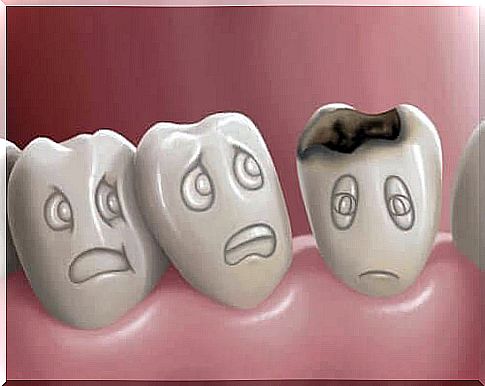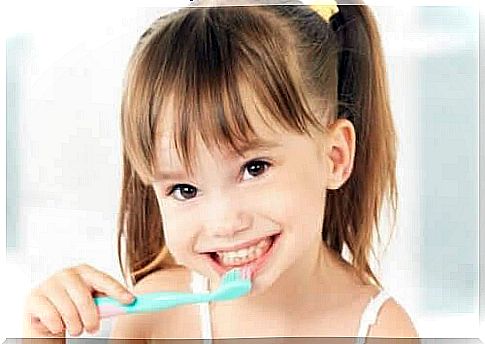Holes In The Teeth And How To Prevent Them

Cavities in the teeth are a common health problem. They affect both children and adults, and they can be quite serious. They hurt, are a source of infection and can even completely destroy the teeth. Here we talk in more detail about what holes in the teeth are and what you can do to prevent them in your children.
What are cavities in the teeth and why do you get them?
Holes in the teeth are infections in the teeth caused by microorganisms that belong to the common bacterial flora in our mouths. This includes, among others, Streptococcus mutans. The bacteria that can produce cavities in the teeth are called cariogenic bacteria .
These bacteria eat the sugar in the mouth and then produce acids. In turn, these acids affect the enamel on our teeth and destroy a little at a time the deepest layers of our teeth. This process – called demineralization – is the origin of cavities in the teeth.
But our bodies also have their own defense mechanisms. Saliva, for example, has several purposes. One purpose is to remineralize the enamel on our teeth and prevent cavities from forming. The same goes for fluoride, which our bodies can use to strengthen the surface of our teeth.
In the initial stages, an incipient hole usually shows no symptoms at all. But over time, they cause pain, are a source of infection and completely destroy the teeth. It can also affect adjacent teeth. Therefore, it is important to treat cavities as soon as possible to avoid more serious complications.
The most common location for holes is in the molars, as these teeth have a more irregular surface. However, you can get holes in the teeth in any tooth. Holes in the teeth from drinking from a baby bottle are a certain type of hole that usually affects the upper front teeth.
How to prevent cavities in the teeth?
To prevent cavities in the teeth, it is important to take action on several fronts:
Eat healthy:
- Reduce your intake of sugary foods as well as sugary drinks and sticky foods that stay on your teeth for a long time.
- Eating sugar between meals is even more risky. This is because it usually takes longer before we brush our teeth again and get rid of the sugar.
- Make sure that children do not fall asleep with their baby bottle or your breast in their mouth or have it in their mouth for a long time. If the sugar in the milk remains in contact with the teeth for a long time, this can also lead to cavities in the teeth.
Hygiene:
- It is important for children to have good dental hygiene from an early age. This means that they brush their teeth at least twice a day. For young children, this requires adult supervision and / or assistance.
- Fluoride helps to strengthen teeth and prevent tooth decay. This substance is found in some toothpastes, mouthwashes and tap water.
- It is also important for the expectant mother to take care of her own dental hygiene during pregnancy. Also, avoid putting your baby’s pacifier in your own mouth, licking his or her spoon and blowing on his or her food. These habits may seem innocent, but all we do is pass on our bacteria to our children.

Go to the dentist:
Go to the dentist regularly from an early age because it also helps prevent the formation of cavities. If a hole has appeared, a visit to the dentist often also helps to treat it at an early stage. In this way, infections can be prevented and lead to major dental damage.
Conclusion
As I said, cavities are a common health problem that affects the general population from an early age. We should never neglect to take care of our own mouths regularly, as well as our children.
Caries can occur for a number of reasons, and there are some factors that we can not avoid. But healthy eating habits and good dental hygiene from an early age make a big difference. Both help prevent infection and serious complications.









